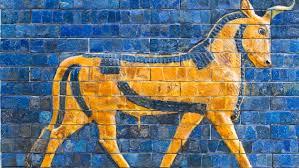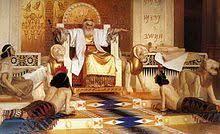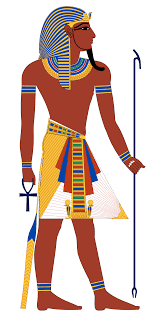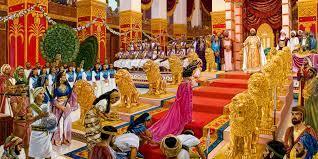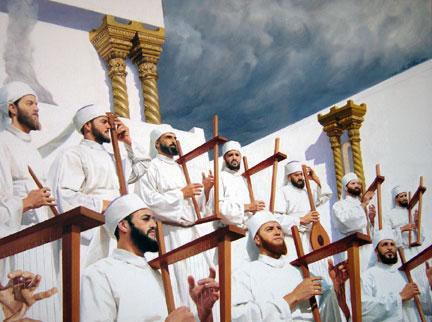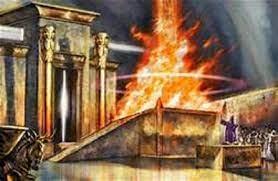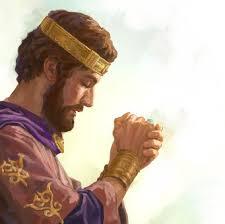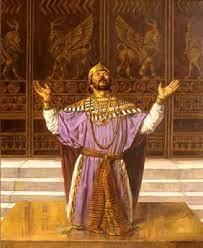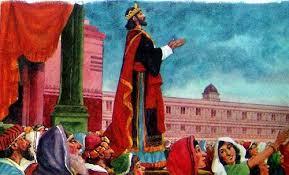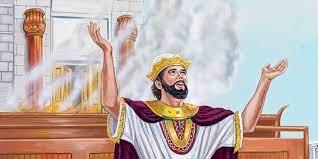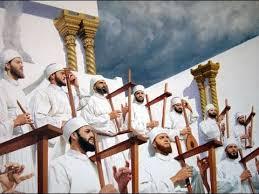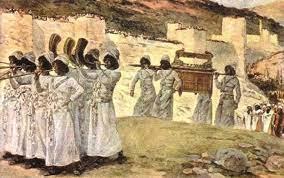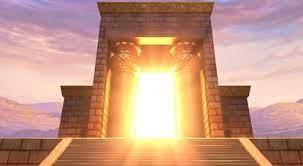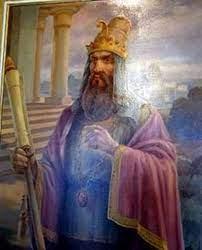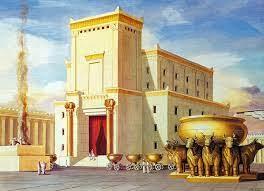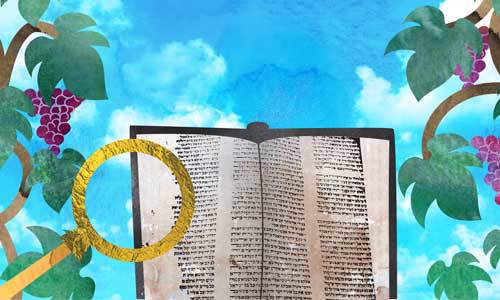Bx – Solomon’s Wives First Kings 11: 1-8
Solomon’s Wives
First Kings 11: 1-8
Solomon’s wives DIG: What was Solomon’s basic problem? Why didn’t his wisdom save him? Why was intermarriage forbidden (Deuteronomy 7:1-4)? What purpose did royal weddings serve? Why have concubines? What happened in the worship of Molech (Second Kings 23:10). Why is God so harsh, knowing that those shrines were only for the wives?
REFLECT: What is my heart condition? What is the greatest object of my affections? Honestly, am I growing ever more deeply in love with Yeshua, or is my heart turning away toward tragedy, as Solomon’s did? What weaknesses hurts my relationship with ADONAI? With others? How was the worship of Molech then similar to the worship of abortion of today?
Even the greatest spiritual gifts will not keep us from sin if our hearts turn away from God.
Most Bible stories are comedies – not in the popular sense in that they are funny, but in the literary sense that they have a happy ending. Noah and his family passed through the deep waters of the great Flood, but they saw the rainbow on the other side. Joseph got sold into slavery, but rose to greatness and saved Jacob and his family from famine. And so on. The Bible is full of happy endings. The happiest of all, of course, is the Gospel, in which Yeshua rises again on the third day after dying, and then comes to us with the promise that our own story will have a happy ending also: eternal life through faith in Him.
But not every story has a happy ending. Some Bible stories are tragedies – not simply in the popular sense that they are sad, but in the more technical sense that we use the word “tragedy” in literature. Shakespeare wrote several famous tragedies – great plays like King Lear, Othello, and Romeo and Juliet. And before that there were the ancient Greek tragedies. From these tragedies, we learn that a tragedy is a story of a great man who makes a wrong choice and falls into bitter disgrace and (sometimes) learns from his mistakes.
One of the saddest tragedies in the Bible is the story of Solomon. He was the greatest king the world had ever seen. Yet, at the end of his life he made one of the most disastrous choices ever made, with tragic consequences for himself and his kingdom. O Solomon! Where did you go so wrong, and what lessons can we learn to avoid making the same mistakes that you did?215
Solomon’s greatness: A tragedy is always a story about some great person, even more, greatness of spirit. Solomon meets this qualification and then some, for he was one of the greatest men who ever lived. To begin with, he came from a noble birth. As the son of David, he was heir to the world’s most famous dynasty. He was the king of Isra’el. Furthermore, almost everything he did was a total success. He was a famous builder. His golden Temple in Jerusalem was one of the wonders of the ancient world. In addition to everything else, Solomon was a man of prayer. Very simply, Solomon was one of the greatest men who ever lived. Anyone who ever heard the wisdom of his counsel or watched him lead people in prayer would never have expected his kingship to end in tragedy. “Anyone by Solomon,” they would have said. “He is the last person that I would imagine falling into serious sin.”
Dear Heavenly Father, How Holy and Awesome You are! Praise You for loving me with a love greater than anyone could conceive. Praise You that Your love is always steadfast and You are totally righteous and faithful. For as high as the heavens are above the earth, so great is his steadfast love toward those who fear him (Psalms 103:11). Your steadfast love, O Lord, extends to the heavens, Your faithfulness to the clouds. Your righteousness is like the mountains of God; Your judgments are like the great deep (Psalms 36:4-5b).
If Solomon had focused on eternal pleasures rather than temporal joys, his life on earth and in heaven would have been filled with eternal joys! Please help me to always remember that life on earth is fleeting, both the good times and the hard times; but heaven will last forever! It is a joy to please You now, even when others laugh at us and tell us of the pleasures that we are missing. How much better to live with our eye on the eternal reward of being with You! Knowing that he who raised the Lord Yeshua will raise us also with Yeshua and bring us with you into His presence . . . For this light momentary affliction is preparing for us an eternal weight of glory beyond all comparison (Second Corinthians 4:14 and 17). I love you! In Yeshua’s holy name and power of His resurrection. Amen
Solomon’s folly: In a tragedy, the main character is always responsible for his own downfall, since he has made the tragic choice. The Greek word Aristotle used for this tragic flaw was hamartia, which also happens to be one of the most important words in the B’rit Chadashah for sin – missing the mark. Some defect which is painful or destructive. So what was Solomon’s destructive defect? King Solomon was not faithful in his marriage, he loved many foreign women besides the daughter of Pharaoh (see the commentary on Deuteronomy, to see link click Br – Do Not Commit Adultery). He foolishly squandered his affections on women he was forbidden to touch. There were women from the Moabites, Amorites, Edomites, Tzidoni and Hittites. And having foreign wives was a violation of Exodus 34:15-16 and Deuteronomy 7:3-4. When the Bible says that Solomon was deeply attached to them by his love, the connotation is frankly sexual. He had 700 wives, all princesses, and 300 concubines (First Kings 11:1 and 3).
But Solomon was guilty of more than sexual sin. The mention of princesses is a clear indication that many of those marriages represented political alliances. By marrying the daughters of foreign kings, Solomon was practicing politics, lusting after power as well as sex. Those women came from the very nations that God told Isra’el to drive out of the Promised Land. Yet, Solomon foolishly allowed them to share his bed.
Even worse, the king began to worship their gods. This was something that Ha’Shem had warned about from the very beginning: Don’t intermarry with them – don’t give your daughter to his son, don’t take his daughter for your son. For he will turn your children away from following Me in order to serve other gods. If this happens, the anger of ADONAI will flare up against you, and He will quickly destroy you (Deuteronomy 7:3-4). The issue with those foreign wives was not their ethnicity, but their religion. The women whom Solomon married did not believe in the God of Abraham, Isaac, and Jacob, but came from nations about which ADONAI had said to the people of Isra’el, “You are not to go among them or they among you, because they will turn your hearts away toward their gods.” But Solomon clung (Hebrew: dabaq) to these pagan women in love (11:2).216
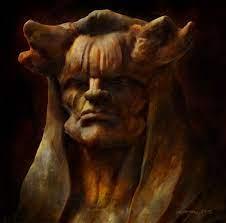
Solomon’s polygamy turned him into a polytheist. For when Solomon became old, his wives turned his heart away toward other gods; so that he was not wholehearted with ADONAI his God, as David his father had been. Solomon followed ‘Ashtoreth the goddess of the Sidonians and Milkom the abomination of the Ammonites (First Kings 11:4-5). Ashtoreth was the sex goddess of the Canaanites. Mikom is less familiar, although some scholars identify him with Molech, who was worshiped with child sacrifices (Jeremiah 32:35). Nevertheless, Solomon built a high place for Chemosh the abomination of Mo’av on the hill in front of Jerusalem, and another for Molech the abomination of the people of ‘Amon. This is what he did for all his foreign wives, who then offered and sacrificed to their gods (First Kings 11:7-8). The hill east of Jerusalem is the Mount of Olives, which stands directly opposite the Temple Mount. Thus, Solomon practiced those damnable pagan rites of worship within plain sight of God’s Holy Temple. The one that Solomon himself had built and dedicated!217
Thus, Solomon did what was evil in ADONAI’s view and did not fully follow ADONAI, as David his father had done (First Kings 11:6). What Solomon did was not only wicked, but also foolish. It was foolish to lust after sex and power, foolish to have a thousand wives, and foolish to worship their gods. These things were foolish because they violated God’s Word.
Solomon’s wicked folly is very familiar, because the sins that he committed are just as common today. We are living in a sex-crazed society, where the seductions of sin are always on display. Longing for intimacy, young believers today are often tempted to do what Solomon did and have relations with someone who doesn’t even believe in the God of the Bible. Rather than worshiping the one true God, they worship many false gods: money and pleasure, work and leisure, self and sexuality. Solomon seems like the perfect king for these postmodern times. His sins are still very much with us, which means that we ourselves may be in danger of a tragic downfall. Unless we learn from his mistakes, we might fall to sexual temptation, end up marrying an unbeliever, or get involved with false religion, just like he did.218
Lesson 1 – The little choices we make: Typically, a tragic hero will learn from his mistakes. His story does not simply end in destruction, but leads to some profound recognition of what went wrong. The hero comes to a place of self-awareness where he sees the tragic choice that led to his tragic failure. He may even come to the point of repentance.
First Kings does not directly tell us what Solomon learned from his mistakes. For this we need the book of Ecclesiastes (to see link click Cc – The Failure of Earthly Things), where he learned to fear ADONAI and keep His mitzvot (Ecclesiastes 12:13). Yet, we can study First Kings and look carefully at what went wrong. Solomon’s famous wisdom failed him, but he may yet become a source of wisdom for us.
First, we start falling into sin long before we fall into disgrace. So if we wish to avoid our own tragic downfall, we need to fight against every little sin that creeps into our lives by the power of the Ruach Ha’Kodesh. Notice the contrast, or even contradiction, between the way Solomon’s life began and the way it ended. When he rose to power and chose wisdom over wealth, the Bible tells us that he loved ADONAI (First Kings 3:3). The word used here for love (Hebrew: ahab) is the same word that is used at the end of his life to describe the king’s relationship to foreign women (First Kings 11:1). An absolute change had taken place in Solomon’s affections. The man who once loved God ended up loving many pagan wives. Tragic.
How did this change take place? It didn’t happen overnight. Solomon started falling into sin long before he ever fell into disgrace. He didn’t wake up one day and suddenly decide to stop loving God and start loving someone else. No, the spiritual change happened little-by-little, as it always does. His life was like a tower of blocks. With each tragic and sinful choice, he was pulling another block out of the structure of his existence. For a long time his life still seemed solid, at least from the outside. But the king was getting weaker and weaker until finally he collapsed in a heap of ungodly sins.
Learn from Solomon’s mistake! Resist every little sin as if your life depended on it. The Puritans sometimes compared little sins to baby snakes: they are tiny, but deadly, and if they are not put to death when they hatch, they will grow up to be huge serpents. So whenever we see a little sin creep into our lives, we need to resist it with the power of the Ruach Ha’Kodesh. Then we should ask ADONAI to give us the grace to make the right choices with our money, our relationships, and everything else in life. Even if it is only a small decision, making the right decision will keep us from falling into spiritual decline. If we are young, we are wise to choose the road that God wants us to take in life and then stay on it. If we are old and have already chosen a good path, we should not turn away from it the way Solomon did in his later years. Choose for Yeshua and then keep choosing for him all the way to the end of your life.219
Lesson 2 – Sin is where the heart is: This lesson helps us understand the mystery of Solomon’s tragedy. How could such a wise man be so foolish? If God truly gave Solomon the gift of wisdom, then why wasn’t he wise enough to avoid falling into disgrace? The answer is that the gifts of God never operate independently or automatically, but always according to the affection of our hearts. The heart is the control center of our lives, and thus the use of our gifts is governed by the condition of our heart. Our talents can be useful for building the kingdom of God, but only if our hearts are committed to the glory of God. If our hearts turn away from God, even the gifts that He has given us will be used against Him.
At the beginning of his reign, Solomon’s heart was in the right place. The reason he asked God for wisdom was that he had a heart for God’s people and he wanted to rule them well. When he prayed for an understanding mind, more literally he requested an understanding heart (First Kings 3:9). Having a heart for God is the essence of what it means to be a believer. Solomon started out with that holy affection; the living God was his first and truest love. This was evident from the way he governed his people and prayed to God.
The tragedy is that Solomon’s heart ended up in the wrong place. He lost his first love (see the commentary on Revelation Az – The Church at Ephesus). These verses emphasize this by diagnosing his downfall as heart failure. In First Kings 11:1 we read that the king loved many foreign women. Then in First Kings 11:2, when God explains what is wrong with taking pagan brides, He says: They will turn your hearts away toward their gods. And that is exactly what happened: His wives turned his heart away. Or again: For when Solomon became old, his wives turned his heart away toward other gods; so that he was not wholehearted with ADONAI his God (First Kings 11:4).
The vocabulary used to describe the change in Solomon’s heart is enlightening. The TaNaKh typically uses the verb for clinging (Hebrew: dabaq) to describe the way someone holds on to God by faith (Deuteronomy 30:20). But in Solomon’s case the same verb is used to describe how Solomon clung (Hebrew: dabaq) to his wives in love (11:2). The Bible says it over and over again: Solomon’s story became a tragedy because his heart loved other things more than the living God. He did love God, to a certain extent, but he had a deeply divided heart that also loved too many women and worshiped too many gods.
If our hearts turn away from God, our spiritual gifts will not prevent us from falling into serious sin. Solomon’s wisdom did not keep him holy, nor did the Temple he built keep him from idolatry. The Bible says that Solomon ended up doing what was evil in ADONAI’s view (First Kings 11:6). The same man who was wise enough to build a house for God was so foolish that he ended up building high places for the worship of pagan deities. Learn from Solomon’s mistake and apply this lesson to your own life: spiritual gifts will not keep us from sin if we have a heart that is turning away from God.
What ever happened to old king Solomon? People wonder what happened to Solomon in the end. Did he ever repent of his sins? Will we see him in heaven? Was he saved? This is always the most important question for anyone? Nothing is more important in life than where we will end up for eternity. For eternity is a long, long time. A person may commit harmful sins, as Solomon did, yet still end up in heaven by the grace of God through faith in Yeshua. We are saved by grace alone, through faith alone, in Messiah alone.
We have good reason to be hopeful about Solomon’s salvation. One reason to be hopeful is that ADOANI had promised David that although his son would be disciplined, he would not be abandoned: I will be a father for him, and he will be a son for Me. If he does something wrong, I will punish him with a rod and blows, just as everyone gets punished; nevertheless, my grace will not leave him, as I took it away from Sha’ul, whom I removed from before you (Second Samuel 7:14-15). If the book of Ecclesiastes is any indication, the king learned from his mistakes and came back into a right relationship with God.
Whether or not Solomon was saved or not, we can be absolutely sure of our own salvation. Even after all our wrong affections – after all the times that our own hearts have wandered away from the God we love – our salvation is still secure (see the commentary on The Life of Christ Ms – The Eternal Security of the Believer). ADONAI has mercy for us, even after all the tragic choices that we have made and all the wrong affections that have led us away from Him. Therefore, Yeshua is a new kind of hero, one who steps into our tragic story to take our place. We are the people with the tragic and sinful flaw. We are the ones who deserve to suffer the consequences of our sin. Yet Yeshua has stepped in to suffer the wrath of God in our place. This is why He came into the world: to enter into our tragic situation and rescue us from our downfall. By dying in our place, Yeshua turns our tragedy into a comedy – a story with a happy ending. Ha’Shem is angry with us because of our sin. We deserve to fall under his righteous judgment. But God has saved us from His own wrath by sending His Son to be our Savior.220



